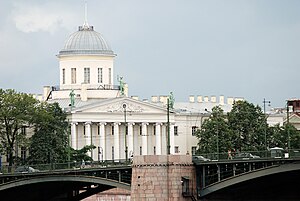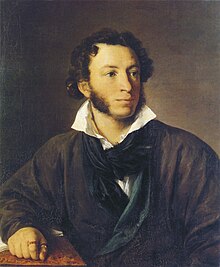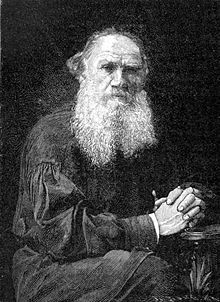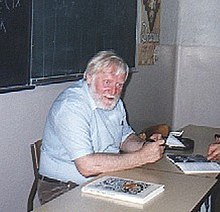Russian literature
This article is about literature from Russia. For the song by Maxïmo Park, see Our Earthly Pleasures.

Russian literature refers to the literature of Russia or its émigrés, and to the Russian-language literature of several independent nations once a part of what was historically Russia or the Soviet Union. Prior to the nineteenth century, the seeds of the Russian literary tradition were sown by the poets, playwrights and writers as Derzhavin, Fonvizin, Sumarokov, Trediakovsky, Karamzin and Krylov. From around the 1830s Russian literature underwent an astounding golden age, beginning with the poet and novelist Aleksandr Pushkin and culminating in two of the greatest novelists in world literature, Leo Tolstoy and Fyodor Dostoevsky, and the short story writer and playwright Anton Chekhov. In the Twentieth Century leading figures of Russian literature included internationally recognised poets such as Vladimir Mayakovsky, Boris Pasternak, Anna Akhmatova and Joseph Brodsky, and prose writers Maxim Gorky, Vladimir Nabokov, Mikhail Sholokhov, Mikhail Bulgakov and Aleksandr Solzhenitsyn.
Early history
Old Russian literature consists of several masterpieces written in the Old Russian language (not to be confused with the contemporaneous Church Slavonic). Anonymous works of this nature include The Tale of Igor's Campaign (Слово о Полку Игореве, Slovo o Polku Igoreve) and the Praying of Daniel the Immured (Моление Даниила Заточника, or Moleniye Daniila Zatochnika). The so-called жития святых (zhitiya svyatikh, lives of the saints) formed a popular genre of the Old Russian literature. The Life of Alexander Nevsky (Житие Александра Невского, or Zhitiye Aleksandra Nevskovo) offers a well-known example. Other Russian literary monuments include Zadonschina, Physiologist, Synopsis and A Journey Beyond the Three Seas. Bylinas – oral folk epics – fused Christian and pagan traditions. Medieval Russian literature had an overwhelmingly religious character and used an adapted form of the Church Slavonic language with many South Slavic elements. The first work in colloquial Russian, the autobiography of arch priest Avvakum, emerged only in the mid-17th century.
Petrine era
The modernization of Russia, commonly associated with Peter the Great and Catherine the Great, coincided with a reform of the Russian alphabet and increased tolerance of the idea of employing the popular language for general literary purposes. Authors like Antioch Kantemir, Vasily Trediakovsky, and Mikhail Lomonosov in the earlier 18th century paved the way for poets like Derzhavin, playwrights like Sumarokov and Fonvizin, and prose writers like Radishchev and Karamzin; the latter is often credited with creation of modern Russian literary language.
Golden Era

The 19th century is traditionally referred to as the "Golden Era" of Russian literature. Romanticism permitted a flowering of especially poetic talent: the names of Zhukovsky and later that of his protegé Aleksandr Pushkin came to the fore. Pushkin is credited with both crystallizing the literary Russian language and introducing a new level of artistry to Russian literature. His best-known work is a novel in verse, Eugene Onegin. An entire new generation of poets including Mikhail Lermontov, Evgeny Baratynsky, Konstantin Batyushkov, Nikolai Alekseevich Nekrasov, Aleksey Konstantinovich Tolstoy, Fyodor Tyutchev, and Afanasij Fet followed in Pushkin's steps.
Prose was flourishing as well. The first great Russian novelist was Nikolai Gogol. Then came Leskov, Ivan Turgenev, Saltykov-Shchedrin, all mastering both short stories and novels, and novelist Goncharov. Leo Tolstoy and Fyodor Dostoevsky soon became internationally renowned to the point that many scholars have described one or the other as the greatest novelist ever. In the second half of the century Anton Chekhov excelled in writing short stories and became perhaps the leading dramatist internationally of his period.

Other important nineteenth-century developments included Ivan Krylov the fabulist; non-fiction writers such as Belinsky and Herzen; playwrights such as Griboedov and Ostrovsky and Kozma Prutkov (a collective pen name) the satirist.
Silver Age
The beginning of the 20th century ranks as the Silver Age of Russian poetry. Well-known poets of the period include: Alexander Blok, Sergei Esenin, Valery Bryusov, Konstantin Balmont, Mikhail Kuzmin, Igor Severyanin, Sasha Cherny, Nikolay Gumilyov, Maximilian Voloshin, Innokenty Annensky, Zinaida Gippius. The poets most often associated with the "Silver Age" are Anna Akhmatova, Marina Tsvetaeva, Osip Mandelstam and Boris Pasternak.
While the Silver Age is considered as the development of the 19th century Russian literature tradition, some avant-garde poets tried to overturn it: Velimir Khlebnikov, David Burlyuk, Aleksei Kruchenykh and Vladimir Mayakovsky.
Though the Silver Age is famous mostly for its poetry, it gave some first-rate novelists and short-story writers, such as Alexander Kuprin, Nobel Prize winner Ivan Bunin, Leonid Andreyev, Fedor Sologub, Aleksey Remizov, Yevgeny Zamyatin, Dmitry Merezhkovsky and Andrei Bely, though most of them wrote poetry as well as prose.
Soviet era
Soviet-era literature was a new phase for Russian and world literature. It inherited many aspects of the culture of Russia and other parts of the world. It developed features of traditional Russian literature such as realism, a national spirit, and humanism. It denounced life in the old tsarist Russia and encouraged Russians to build a new world.
Maxim Gorky was significant for the development of soviet-era literature. He laid the foundations of socialist realism with his novel "The Mother" and the play "The Enemies." His autobiographical books tell the story of how he goes from the lower strata of society to the heights of culture, leading to his support for revolutionary movements. His novel the "Aratamonov Business" depicts the decay and impending downfall of Russia's ruling classes. In the novel "The Life of Klim Samgin", Gorky is critical of antisocialist ideology and of individualism. The character Klim Samgin represents egoism and moral duplicity while Stepan Kutuzov shows intelligence and energy in his devotion to the revolutionary struggle. [1]
Poetry was a big part of the early revolutionary period with such authors like Bednyi, Mayakovsky, and contributors to the newspapers "Zvezda" and Pravda". Alexander Blok's narrative poem "The Twelve" is about the turning point of the Revolution with emphasis on the role of the popular masses. Works by Bednyi such as "For the Land, for Freedom, for hte Workers" is a generalized portrait of the people in the revolutionary situation. The first play of the Soviet era "Mystery-Bouffe" by Mayakovsky celebrates the Revolution and denounces features of old Russia.
1920s Russian literature was characterized by a revolutionary spirit. Works by Mayakovsky such as "Left March" were groundbreaking for their development of the lyric. Other authors like Kaminsky focused on the theem of a popular uprising in works like "Stepan Razin". Themes about revolutionary discipline were expressed in works such as "Two Worlds" by V. Zazubrin and "The Badgers" by Leonid Leonov.
A significant work was the novel "The Iron Stream" by Serfaimovich, one of the first classics of socialist realism. The novel tells the story about the Taman Army's campaign in the summer of 1918, an actual event of the Civil War. The novel focuses on the people and the difficulties of their struggle. Furmanov's novel "Chapaev" is about the famous army commander. Fadeyev's "The Rout" is also about the social history of the revolution.
Moral conflicts and the development of new human relations caused by the revolution are subjects in works such as "The Week" by Libedinsky, the novel "The Brothers" by Fedin, and Neverov's "Tashkent, the City of Bread". In the novella of a romantic fantasy "Red Sails", A. Grin recounts the triumph of man's dream of happiness.
Works depicting the normalization of life following the victory of the Civil War are depicted in works such as "Cement" by Gladkov, "Blast Furnace" by N. Liashko, and "Timber Mill" by Karavaeva. Leonov's novel "The Thief" shows the psychological drama of the transformation of man from a Civil War fighter to a renegade. In Tolstoy's novella "The Viper", the struggle between old and new during the 1920s becomes an ethical conflict. Sholokhov's "Quiet Flows the Don" is based on the life and mores of the Cossacks and has become one of the most important works in Russian literature. Tolstoy's "Road to Cavalry" depicts the role played in the Revolution by intellectuals.
Capitalism was an object of satire in the 1920s in such works as Mayakovsky's oems "The Pillar", "The Toady", and his play "The Bedbug". In the late 1920s, stories were told about social and moral conflicts of the revolutionary years. M. Bulgakov's play "Days of the Turbins" depicts the sense of doom among the White Guards.
In the beginning of the 1930s, authors were called on to depict more deeply the process of constructing socialism and of the class struggle with an emphasis on the people. Books about socialism and the new life were marked with enthusiasm for the future as well as attacks against the patriarchal system of Old Russia and arousing people to work for the benefit of society. Such themes were illustrated in works such as "Sot" by Leonov. Life in the kolkhozes was reflected in works such as "The Running Start" by Vladimir Stavsky and the novels "Bast Sandals" by P. Zamoisky, "Hatred" by I. Shukov, and "Brusky" by F. Panferov. The dramatic birth of a new way of life in the rural areas was depicted in Sholokhov's "Virgin Soil Upturned". Malyshkin's nove "Backwater People" shows the changes of people from isolated backward regions who take jobs in industrial production.
There was a focus on depicting a new man who had grown up during the Soviet period. Ostrovsky's "How the Steel was Tempered" portrays a young communist devoting his life for the revolutionary cause. The novel's hero Pavel Korchagin became well-known.
Literature during the wartime were based on examples of military valor and courage, such as Leonov's play "Invasion" and the novella "Days and Nights" by Konstantin Simonov". Prominent wartime works show an ideological and moral upsurge with realism and an awareness to unity, such as the poem "Do you Remember, Alesha, the Roads Around SmolensK", Surkov's "The Fire Rages in the Tiny Stove", and poems by "M. Dudin". Tvardovsky's poem "Vasili Terkin" shows a typical Russian soldier who shows qualities that helped the nation win the war; it became a favorite book of millions. Leonov's novel "Russian Forest" focuses on the nation's humanism during the war.
After the war, Russian literature continued to depict the struggle against fascism, such as the novel "The Young Guard" by Fadeyev and "The Story of a Real Man" by Boris Polevoi. There was also an emphasis on labor, with emphasis on dedicated workers and communist leaders. Such characters invcluded Voropaev in the P. Pavlenko's novel "Happiness", the engineers Batmanov and Beridze in the novel "Not Far fro Moscow" by V. Azhaev, and characters in novels by G. Nikolaeva.

Russian / Soviet Science fiction
The Soviet Union produced a large amount of Science fiction literature, inspired by the country's space pioneering. Early science fiction authors, such as Alexander Belayev, Alexey N. Tolstoy, Alexander Kazantsev, stuck to hard science fiction, being influenced by Herbert Wells and Jules Verne.
Since the thaw in the 1960s Soviet science fiction began to form its own style. Philosophy, ethics, utopian and dystopian ideas became its core, and Social science fiction was the most popular subgenre. Books of brothers Arkady and Boris Strugatsky, and Kir Bulychov, among others, are reminiscent of social problems and often include satire on contemporary Soviet society. Ivan Yefremov, on the contrary, arose to fame with his utopian views on future as well as on Ancient Greece in his historical novels.[2] Strugatskies are also credited for the Soviet's first science fantasy, the Monday Begins on Saturday trilogy.
Space opera subgenre was less developed, since both state censors and "serious" writers watched it unfavorably. Nevertheless, there were moderately successful attempts to adapt space westerns to Soviet soil. The first was Alexander Kolpakov with "Griada", after came Sergey Snegov with "Men Like Gods", among others. Bulychov, along with his adult books, created children's space adventure series about Alice Selezneva, a teenage girl from the future.
Post-Soviet era
The end of the 20th century has proven a difficult period for Russian literature, with relatively few distinctive voices. Among the most discussed authors of these period were Victor Pelevin, who gained popularity with first short stories and then novels, novelist and playwright Vladimir Sorokin, and the poet Dmitry Prigov.
A relatively new trend in Russian literature is that female short story writers Tatyana Tolstaya or Lyudmila Petrushevskaya, and novelists Lyudmila Ulitskaya or Dina Rubina have come into prominence.
Detective stories and thrillers have proven a very successful genre of new Russian literature: in the 90s serial detective novels by Alexandra Marinina, Polina Dashkova and Darya Dontsova were published in millions of copies. In the next decade a more "high-brow" author Boris Akunin with his series about the 19th century sleuth Erast Fandorin became widely popular.
Fantasy and Science fiction literature is still among best-selling with authors like Sergey Lukyanenko, Nick Perumov and Maria Semenova. Nealy a half of modern Russian-language science fiction is produced in Ukraine, especially in Kharkiv, home to H. L. Oldie, Marina and Sergey Dyachenko, Alexander Zorich and Andrey Valentinov.
Tradition of classic Russian novel continues with such author as Mikhail Shishkin.
The leading poets of the young generation are arguably Dmitry Vodennikov and Andrey Rodionov, both famous not only for their verses, but also for their ability to artistically recite them.
External influences on Russian literature
French neoclassicism
English sentimentalism
British romantic poetry
Robert Burns became a ‘people’s poet’ in Russia. In Imperial times the Russian aristocracy were so out of touch with the peasantry that Burns, translated into Russian, became a symbol for the ordinary Russian people. In Soviet Russia Burns was elevated as the archetypical poet of the people – not least since the Soviet regime slaughtered and silenced its own poets. A new translation of Burns, begun in 1924 by Samuil Marshak, proved enormously popular selling over 600,000 copies.[3][4] In 1956, the Soviet Union became the first country in the world to honour Burns with a commemorative stamp. The poetry of Burns is taught in Russian schools alongside their own national poets. Burns was a great admirer of the egalitarian ethos behind the French Revolution. Whether Burns would have recognised the same principles at work in the Soviet State at its most repressive is moot. This didn’t stop the Communists from claiming Burns as one of their own and incorporating his work into their state propaganda. The post communist years of rampant capitalism in Russia have not tarnished Burns' reputation. [5]
George Gordon Byron was a major influence on almost all Russian poets of the Golden Era, including Pushkin, Vyazemsky, Zhukovsky, Batyushkov, Baratynsky, Delvig and, especially, Lermontov[6].
Russian literature abroad
Russian literature is not only written by Russians. In the Soviet times such popular writers as Belarusian Vasil Bykov, Kyrgyz Chinghiz Aitmatov and Abkhaz Fazil Iskander wrote some of their books in Russian. Some renowned contemporary authors writing in Russian have been born and live in Ukraine (Andrey Kurkov, Marina and Sergey Dyachenko) or Baltic States (Garros and Evdokimov).
A number of prominent Russian authors such as novelists Mikhail Shishkin, Ruben Gonsales Gallego, Svetlana Martynchik and Dina Rubina, poets Alexei Tsvetkov and Bakhyt Kenjeev, though born in USSR, live and work in Europe, North America or Israel.
Themes in Russian books
Suffering, often as a means of redemption, is a recurrent theme in Russian literature. Dostoevsky in particular is noted for exploring suffering in works such as Notes from Underground and Crime and Punishment. Christianity and Christian symbolism are also important themes, notably in the works of Dostoevsky, Tolstoy and Chekhov. In the 20th century, suffering as a mechanism of evil was explored by authors such as Solzhenitsyn in The Gulag Archipelago. A leading Russian literary critic of the 20th century Viktor Shklovsky, in his book, Zoo, or Letters Not About Love, wrote, "Russian literature has a bad tradition. Russian literature is devoted to the description of unsuccessful love affairs."
See also
- List of Russian language poets
- Russian Formalism
- Russian Literature (journal)
- Pushkin House
- List of Russian writers
- Skazka
- Russian philosophy
- Russian science fiction and fantasy
External links
- Encyclopedia of Soviet Writers
- Maxim Moshkov's E-library of Russian literature (in Russian)
- Contemporary Russian Poets Database (in English)
- Contemporary Russian Poets in English translation
- La Nuova Europa: international cultural journal about Russia and East of Europe
- Information and Critique on Russian Literature
- Russian Classics Bulletin by Erik Lindgren (Turgenev, Tolstoy, Dostoyevsky)
- History of Russian literature Brief summary
- Russian Liteary Resources by the Slavic Reference Service
- Search Russian Books (in Russian)
- Philology in Runet. A special search through the sites devoted to the Old Russian literature.
- Публичная электронная библиотека Е.Пескина
- Herbermann, Charles, ed. (1913). . Catholic Encyclopedia. New York: Robert Appleton Company.
References
- ^ http://slovari.yandex.ru/dict/bse/article/00067/04500.htm?text=Российская%20Советская%20Федеративная%20Социалистическая%20Республика%20&encid=bse&stpar1=1.1.1
- ^ Encyclopedia Britannica. Science fiction
- ^ http://www.europadisc.co.uk/classical/69045/Russian_Settings_of_Robert_Burns.htm
- ^ http://www.standrews.com/burns/HERALDWRITINGS/feature30.html
- ^ http://heritage.scotsman.com/robertburns/From-Rabbie-with-love.2617247.jp
- ^ http://feb-web.ru/feb/slt/abc/lt1/lt1-0831.htm
